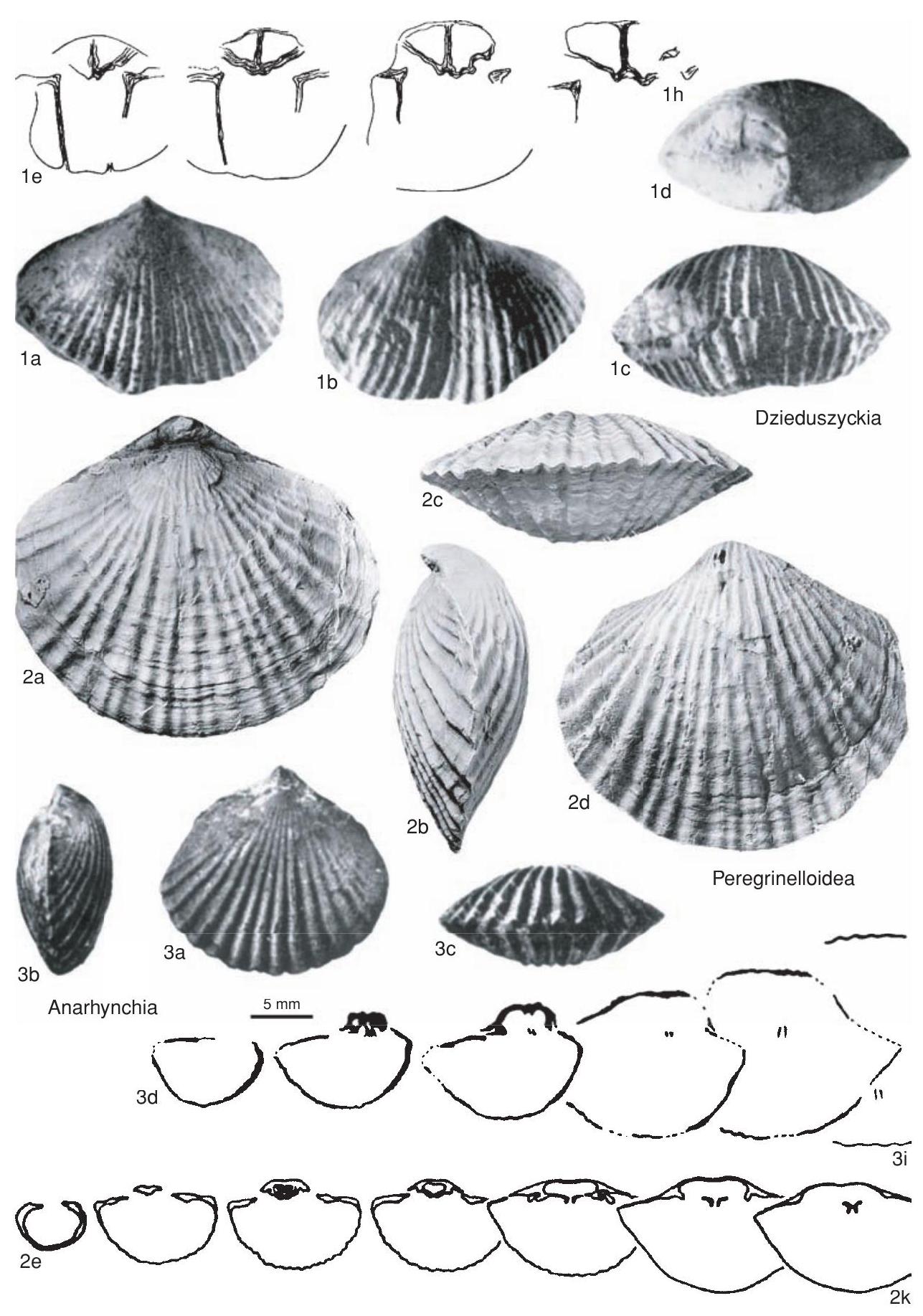Welcome to the Treatise on Invertebrate Paleontology!
Please enter a genera name to retrieve more information.

Dzieduszyckia
Classification
Phylum:
Brachiopoda
Subphylum:
Rhynchonelliformea
Class:
Rhynchonellata
Order:
Rhynchonellida
Superfamily:
Dimerelloidea
Family:
Peregrinellidae
Subfamily:
Dzieduszyckiinae
Formal Genus Name and Reference:
Dzieduszyckia SIEMIRADZKI, 1909, p. 768
Type Species:
Terebratula (?) kielcensis ROEMER, 1866, p. 671, OD
Images
(Click to enlarge in a new window)
Fig. 846, 1a-b. *D. kielcensis (Roemer), upper Famennian, Holy Cross Mountains, Kielce, Kadzielnia Quarry, Poland, a-d, neotype, dorsal, ventral, anterior, and posterior views, x1, e-h, serial sections 23.3, 22.8, 22.5, 21.5 ~mm from anterior, x6 (Biernat, 1967).
Synonyms
Eoperegrinella, Halorella
Geographic Distribution
Poland, Morocco, Urals, Kazakhstan, USA
Age Range
Beginning Stage in Treatise Usage:
Upper Devonian (Famennian)
Beginning International Stage:
Famennian
Fraction Up In Beginning Stage:
0
Beginning Date:
371.1
Ending Stage in Treatise Usage:
Upper Devonian (Famennian)
Ending International Stage:
Famennian
Fraction Up In Ending Stage:
100
Ending Date:
359.3
Description
Large with outline transversely ovate and profile biconvex. Beak prominent. Bisulcate with ventral sulcus usually more marked, anterior commissure weakly uniplicate to rectimarginate, serrate. Shells commonly asymmetrical, possibly resulting from crowding in monospecific groups. Costae numerous, rounded, arising at beaks, simple or sometimes dichotomous. Dental plates distinct, vertical to slightly convergent ventrally, well separated from valve walls, leaving large lateral umbonal cavities, teeth small, ventral muscle field only weakly impressed. Dorsal median septum long, low, septalium distinct, small, crura long, thin, closely set.
References
Museum or Author Information
Classification
Phylum:
Brachiopoda
Subphylum:
Rhynchonelliformea
Class:
Rhynchonellata
Order:
Rhynchonellida
Superfamily:
Dimerelloidea
Family:
Peregrinellidae
Subfamily:
Dzieduszyckiinae
Formal Genus Name and Reference:
Dzieduszyckia SIEMIRADZKI, 1909, p. 768
Type Species:
Terebratula (?) kielcensis ROEMER, 1866, p. 671, OD
Images
(Click to enlarge in a new window)
Fig. 846, 1a-b. *D. kielcensis (Roemer), upper Famennian, Holy Cross Mountains, Kielce, Kadzielnia Quarry, Poland, a-d, neotype, dorsal, ventral, anterior, and posterior views, x1, e-h, serial sections 23.3, 22.8, 22.5, 21.5 ~mm from anterior, x6 (Biernat, 1967).
Synonyms
Eoperegrinella, Halorella
Geographic Distribution
Poland, Morocco, Urals, Kazakhstan, USA
Age Range
Beginning Stage in Treatise Usage:
Upper Devonian (Famennian)
Beginning International Stage:
Famennian
Fraction Up In Beginning Stage:
0
Beginning Date:
371.1
Ending Stage in Treatise Usage:
Upper Devonian (Famennian)
Ending International Stage:
Famennian
Fraction Up In Ending Stage:
100
Ending Date:
359.3
Description
Large with outline transversely ovate and profile biconvex. Beak prominent. Bisulcate with ventral sulcus usually more marked, anterior commissure weakly uniplicate to rectimarginate, serrate. Shells commonly asymmetrical, possibly resulting from crowding in monospecific groups. Costae numerous, rounded, arising at beaks, simple or sometimes dichotomous. Dental plates distinct, vertical to slightly convergent ventrally, well separated from valve walls, leaving large lateral umbonal cavities, teeth small, ventral muscle field only weakly impressed. Dorsal median septum long, low, septalium distinct, small, crura long, thin, closely set.
